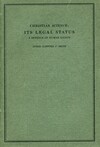

Are you sure?
This bookmark will be removed from all folders and any saved notes will be permanently removed.
Christian Science: Its Legal Status
Christian Science, as its name indicates, is an interpretation of the religion that was taught and practised by Christ Jesus. Any one who, without hostility, reads the Christian Science text-book, "Science and Health with Key to the Scriptures" by Mrs. Eddy, will find it to be based on the Scriptures, and will find in it a more obvious correspondence or plainer consistency with the Bible than is furnished by any of the more popular interpretations. Such a reader of this book will see that it contains a statement of knowledge or science concerning God, man, and the universe, with which he may or may not agree, but which is plainly ethical, scientific, and religious in character. Be it called orthodox or heterodox, when compared with either primitive or recent Christianity, the system of thought presented as Christian Science is plainly Christian in basis and purpose. If this be true, it would tend to promote the health, morals, and spiritual welfare of its adherents; and it is a matter of common knowledge that a multitude of intelligent people bear witness to these benefits from this teaching.
Independence within the field of science is favored by enlightened public opinion, because such independence is essential to progress. There would be small hope of advancement if those who endeavor to extend the scope of human knowledge, or to correct it, were obliged to square their views with the beliefs which for the moment are prevalent. It is largely from the teachings of original and independent thinkers that the world gains more knowledge and true knowledge.
The fact, therefore, that Christian Science differs from the opinions which are at present held by the majority of people respecting the cause and cure of disease, furnishes no reason why the government should attempt to hinder or suppress its practice. It is generally known that the medical theory and practice with respect to this matter has been profoundly modified since the teaching and practice of Christian Science began, and at least in part by reason thereof. In these forty odd years the use of drugs has greatly diminished, various drugless systems have gained a wide vogue despite ridicule and opposition, and the mental element in the cause and cure of disease is more and more taken into account by all schools.
Enjoy 1 free Sentinel article or audio program each month, including content from 1898 to today.
JSH Collections
This article is included in:
1914 - PAMPHLET
Christian Science: its legal status: a defence of human rights
JSH-Online has hundreds of pamphlets, anthologies, and special editions for you to discover.

June 6, 1914 issue
View Issue-
Reality versus Unreality
SAMUEL GREENWOOD
-
Christian Science: Its Legal Status
JUDGE CLIFFORD P. SMITH
-
Stories for Children
MANA WILLIS FISHER
-
Feeding the Five Thousand
BELLE F. KERR
-
In a recent article there is a reference to the views of a...
Frederick Dixon
-
In the recent sermon on Christian Science reported in the...
Charles E. Jarvis
-
The Pine
WARWICK JAMES PRICE
-
Shifting Sands
Archibald McLellan
-
Church-membership
Annie M. Knott
-
The Note of Authority
John B. Willis
-
The Lectures
with contributions from Governor Felker, John N. Greer, Elbert E. Stevens, William H. Sinclair, Clarence A. Buskirk, William H. Dawes
-
During July and August, 1912, I had dental work done...
Genevieve Ernst with contributions from H. Phillips
-
Not because of any religious convictions or because I felt...
Helen Cram with contributions from J. O. Cram
-
I learned what Christian Science really is about a year ago,...
Martha Anderton Howe
-
Gratitude for freedom in Truth and a desire to encourage...
Ella M. Kinsley
-
One day a shotgun was accidentally discharged close to...
William F. Winship
-
Christian Science was brought to my notice seventeen...
Lettie Sherman
-
"Songs in the night"
SAMUEL JOHNSTONE MACDONALD
-
From Our Exchanges
with contributions from H. S. McClelland, William C. Billings, T. Rhondda Williams, John Haynes Holmes


